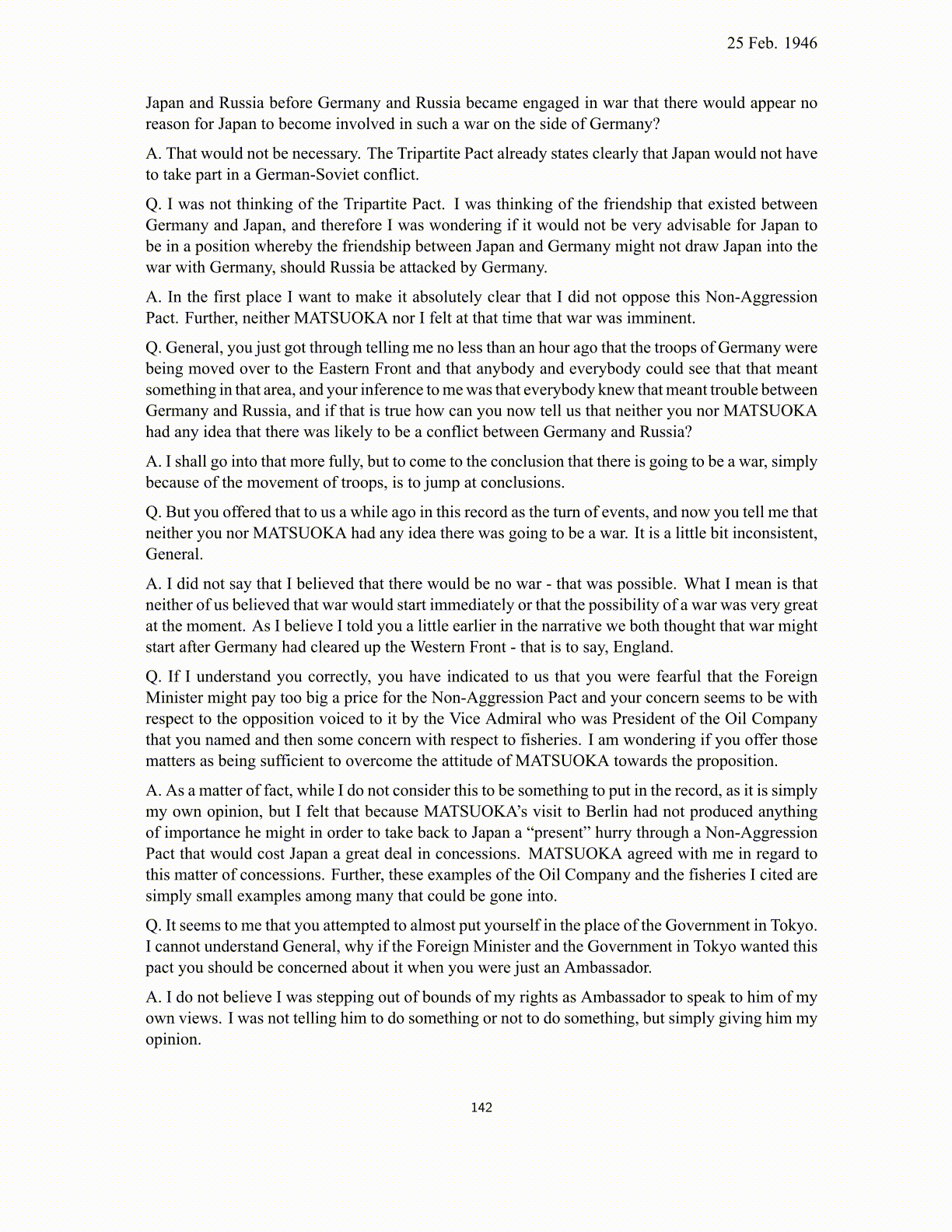
25 Feb. 1946 Japan and Russia before Germany and Russia became engaged in war that there would appear no reason for Japan to become involved in such a war on the side of Germany? A. That would not be necessary. The Tripartite Pact already states clearly that Japan would not have to take part in a German-Soviet conflict. Q. I was not thinking of the Tripartite Pact. I was thinking of the friendship that existed between Germany and Japan, and therefore I was wondering if it would not be very advisable for Japan to be in a position whereby the friendship between Japan and Germany might not draw Japan into the war with Germany, should Russia be attacked by Germany. A. In the first place I want to make it absolutely clear that I did not oppose this Non-Aggression Pact. Further, neither MATSUOKA nor I felt at that time that war was imminent. Q. General, you just got through telling me no less than an hour ago that the troops of Germany were being moved over to the Eastern Front and that anybody and everybody could see that that meant something in that area, and your inference to me was that everybody knew that meant trouble between Germany and Russia, and if that is true how can you now tell us that neither you nor MATSUOKA had any idea that there was likely to be a conflict between Germany and Russia? A. I shall go into that more fully, but to come to the conclusion that there is going to be a war, simply because of the movement of troops, is to jump at conclusions. Q. But you offered that to us a while ago in this record as the turn of events, and now you tell me that neither you nor MATSUOKA had any idea there was going to be a war. It is a little bit inconsistent, General. A. I did not say that I believed that there would be no war - that was possible. What I mean is that neither of us believed that war would start immediately or that the possibility of a war was very great at the moment. As I believe I told you a little earlier in the narrative we both thought that war might start after Germany had cleared up the Western Front - that is to say, England. Q. If I understand you correctly, you have indicated to us that you were fearful that the Foreign Minister might pay too big a price for the Non-Aggression Pact and your concern seems to be with respect to the opposition voiced to it by the Vice Admiral who was President of the Oil Company that you named and then some concern with respect to fisheries. I am wondering if you offer those matters as being sufficient to overcome the attitude of MATSUOKA towards the proposition. A. As a matter of fact, while I do not consider this to be something to put in the record, as it is simply my own opinion, but I felt that because MATSUOKA’s visit to Berlin had not produced anything of importance he might in order to take back to Japan a “present” hurry through a Non-Aggression Pact that would cost Japan a great deal in concessions. MATSUOKA agreed with me in regard to this matter of concessions. Further, these examples of the Oil Company and the fisheries I cited are simply small examples among many that could be gone into. Q. It seems to me that you attempted to almost put yourself in the place of the Government in Tokyo. I cannot understand General, why if the Foreign Minister and the Government in Tokyo wanted this pact you should be concerned about it when you were just an Ambassador. A. I do not believe I was stepping out of bounds of my rights as Ambassador to speak to him of my own views. I was not telling him to do something or not to do something, but simply giving him my opinion. 142